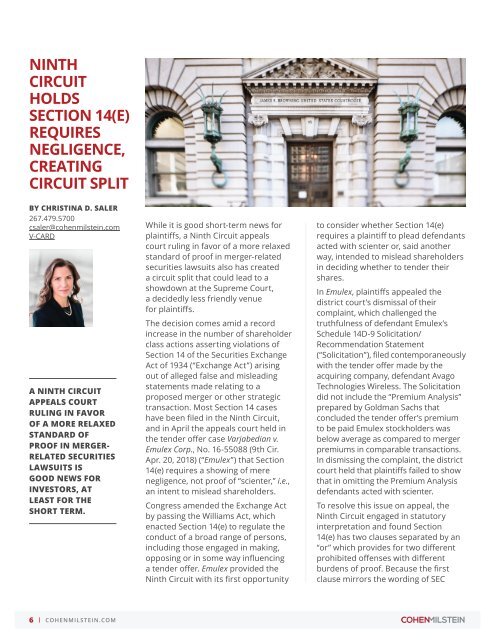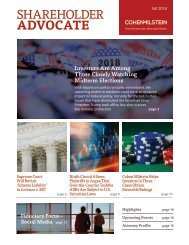Shareholder Advocate Summer 2018
You also want an ePaper? Increase the reach of your titles
YUMPU automatically turns print PDFs into web optimized ePapers that Google loves.
NINTH<br />
CIRCUIT<br />
HOLDS<br />
SECTION 14(E)<br />
REQUIRES<br />
NEGLIGENCE,<br />
CREATING<br />
CIRCUIT SPLIT<br />
BY CHRISTINA D. SALER<br />
267.479.5700<br />
csaler@cohenmilstein.com<br />
V-CARD<br />
A NINTH CIRCUIT<br />
APPEALS COURT<br />
RULING IN FAVOR<br />
OF A MORE RELAXED<br />
STANDARD OF<br />
PROOF IN MERGER-<br />
RELATED SECURITIES<br />
LAWSUITS IS<br />
GOOD NEWS FOR<br />
INVESTORS, AT<br />
LEAST FOR THE<br />
SHORT TERM.<br />
While it is good short-term news for<br />
plaintiffs, a Ninth Circuit appeals<br />
court ruling in favor of a more relaxed<br />
standard of proof in merger-related<br />
securities lawsuits also has created<br />
a circuit split that could lead to a<br />
showdown at the Supreme Court,<br />
a decidedly less friendly venue<br />
for plaintiffs.<br />
The decision comes amid a record<br />
increase in the number of shareholder<br />
class actions asserting violations of<br />
Section 14 of the Securities Exchange<br />
Act of 1934 (“Exchange Act”) arising<br />
out of alleged false and misleading<br />
statements made relating to a<br />
proposed merger or other strategic<br />
transaction. Most Section 14 cases<br />
have been filed in the Ninth Circuit,<br />
and in April the appeals court held in<br />
the tender offer case Varjabedian v.<br />
Emulex Corp., No. 16-55088 (9th Cir.<br />
Apr. 20, <strong>2018</strong>) (“Emulex”) that Section<br />
14(e) requires a showing of mere<br />
negligence, not proof of “scienter,” i.e.,<br />
an intent to mislead shareholders.<br />
Congress amended the Exchange Act<br />
by passing the Williams Act, which<br />
enacted Section 14(e) to regulate the<br />
conduct of a broad range of persons,<br />
including those engaged in making,<br />
opposing or in some way influencing<br />
a tender offer. Emulex provided the<br />
Ninth Circuit with its first opportunity<br />
to consider whether Section 14(e)<br />
requires a plaintiff to plead defendants<br />
acted with scienter or, said another<br />
way, intended to mislead shareholders<br />
in deciding whether to tender their<br />
shares.<br />
In Emulex, plaintiffs appealed the<br />
district court’s dismissal of their<br />
complaint, which challenged the<br />
truthfulness of defendant Emulex’s<br />
Schedule 14D-9 Solicitation/<br />
Recommendation Statement<br />
(“Solicitation”), filed contemporaneously<br />
with the tender offer made by the<br />
acquiring company, defendant Avago<br />
Technologies Wireless. The Solicitation<br />
did not include the “Premium Analysis”<br />
prepared by Goldman Sachs that<br />
concluded the tender offer’s premium<br />
to be paid Emulex stockholders was<br />
below average as compared to merger<br />
premiums in comparable transactions.<br />
In dismissing the complaint, the district<br />
court held that plaintiffs failed to show<br />
that in omitting the Premium Analysis<br />
defendants acted with scienter.<br />
To resolve this issue on appeal, the<br />
Ninth Circuit engaged in statutory<br />
interpretation and found Section<br />
14(e) has two clauses separated by an<br />
“or” which provides for two different<br />
prohibited offenses with different<br />
burdens of proof. Because the first<br />
clause mirrors the wording of SEC<br />
6 I COHENMILSTEIN.COM



